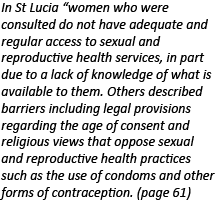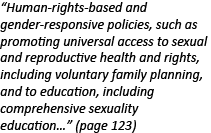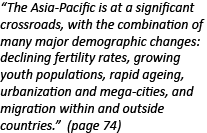A Million Voices: The World We Want – A sustainable future with dignity for all
 Sunday, October 13, 2013 at 5:59PM
Sunday, October 13, 2013 at 5:59PM A Million Voices: The World We Want was produced by the UNDG Millennium Development Goals Task Force, just before the UN General Assembly Special Event. It synthesizes the results of the global consultation that, according to the UN Secretary-General, gave a clear message that “while the post-2015 agenda should and will be determined by governments, people across the world are demanding a say in the decisions that affect their lives.”
Achieving full gender equality and improving health services are among the foremost people’s priorities that should be directly addressed in the future agenda.
The report brings together the outcomes of the MY World and the 88 national consultations by region, as well as the 11 thematic consultations. Other contributions that were also discussed included the High-Level Panel (HLP) and the Sustainable Development Solutions Network (SDSN), the Global Compact and the Open Working Group (OWG). It was generally agreed that the issues covered by the MDGs are still relevant and high on people’s agenda and that there is a need to adapt, refine and deepen the way in which we measure progress.
Health
The report indicates that there is “evidence to suggest that the current health MDGs will remain priorities after 2015.” (page 118) Health concerns dominated the consultations at national and regional level, including addressing problems related to drug availability and inadequate health infrastructure and lack of trained health personnel. (pages 53 & 54) The Health consultation, itself, called for an overall goal of “’sustainable well-being for all’, which could capture the links between health and other aspects of well-being.” (pages 41 & 112) As far as health was concerned there was also a recognition that targets and indicators should be adaptable to a country’s health priorities and circumstances. (page 40) Care and delivery was also singled out in countries in Latin America. (page 61) It is interesting to note that in the MY World and other surveys conducted as part of national consultations “women, for example in Belarus, place higher priority on better quality health services than men…” (page 95)
Inclusion of sexual and reproductive health and rights
Throughout the report there are references to sexual and reproductive health and rights. According to the report of the Health Consultation, for example, the exclusion of “…comprehensive sexual and reproductive health and rights… has hindered progress on the goals themselves, and equitable progress in overall health outcomes.” (page 10) In addition, in connection with MDG Target 5B, it stresses that 222 million women worldwide cannot access modern contraception and sexual and reproductive health services. (page 110) The consultation also called for the reaffirmation of the targets of “ongoing initiatives such as: …providing universal access to sexual and reproductive health services including family planning…” (page 112)
 The importance of engaging with adolescents is emphasized to increase their capabilities to take on their own health development, “especially regarding sexual and reproductive health practices…” (page 113) There are calls for the inclusion of comprehensive sexuality education (CSE) in the curriculum, for example in the Indonesian consultation. (pages 37, 77, 109, 123) CSE was one of the strongest themes in the Multi-Stakeholder Dialogue on Inequalities and was also included in the UNESCO Youth consultation. (page 77)
The importance of engaging with adolescents is emphasized to increase their capabilities to take on their own health development, “especially regarding sexual and reproductive health practices…” (page 113) There are calls for the inclusion of comprehensive sexuality education (CSE) in the curriculum, for example in the Indonesian consultation. (pages 37, 77, 109, 123) CSE was one of the strongest themes in the Multi-Stakeholder Dialogue on Inequalities and was also included in the UNESCO Youth consultation. (page 77)
Gender equality
Gender equality is referred to throughout the document, recognizing that women and girls are among those “being systematically left behind.” Gender-based violence is also noted as a contributing factor that perpetuates inequalities, and is highlighted as a human rights abuse and a manifestation of unequal power relations in both the thematic consultations and across all regions. (page 35) Sexual violence and gender discrimination due to repressive cultural practices was stressed by women’s groups in parts of Africa. (page 56) In the Latin American consultations rates of violence against women were reported as high as 70 percent in some countries. (page 67)
 In some countries also in Africa gender parity has decreased in secondary schools, “with even wider margins in tertiary education.” (page 55) The over-representation of women in informal and unprotected employment and their concentration in sectors and professions driven by gender stereotypes in Asia and Pacific was also noted. (page 74)
In some countries also in Africa gender parity has decreased in secondary schools, “with even wider margins in tertiary education.” (page 55) The over-representation of women in informal and unprotected employment and their concentration in sectors and professions driven by gender stereotypes in Asia and Pacific was also noted. (page 74)
Population dynamics
There are many references to population dynamics in the report related to patterns of population growth, population ageing, migration and urbanization. These are recognized as linked to the job creation and inclusive growth in areas of unemployment or underemployment. Issues around migration focused on international and internal migration and those who are internally displaced. The report notes that migration issues are becoming “increasingly complex.” (page 122) Problems related to employment for women migrants from Nicaragua were noted in Costa Rica, while in Trinidad and Tobago they were employed in those sectors with poorer working conditions and lower wages. (page 64) Moreover, while urbanization can be “a powerful driver of sustainable development, many countries are continuing to experience rapid and unplanned urbanization, which was “entrenching conditions of poverty, environmental degradation and unhealthy lifestyles.” (page 131) The report emphasizes the importance of rights-based and gender-responsive policies in addressing these issues. (page 12 & 123) The population dynamics consultations also suggested the importance of mainstreaming priorities into the post-2015 development agenda framework including strengthening “the formation of human capital throughout the life course, with a particular focus on health, including sexual and reproductive health and rights; education, including comprehensive sexuality education…” (page 123)
 Youth and young people
Youth and young people
The perspectives and needs of young people are included throughout the document. Education is considered to be of importance by young people. Youth employment is also of major concern as unemployment has reached alarming proportions in many countries, with some young people saying they will continuing their studying to improve their job prospects. The Arab States region is projected to have one of the highest percentages of youth (15-24 years) in the world, reaching 73 million by 2015. {page 85)
Strengthening national capacities for data collection and analysis
The Health and Population Dynamics consultations both stressed the need to further strengthen national capacities to collect and analyze demographic and other data, which should be disaggregated by age, sex, disability etc. (page 40)
Sexual orientation
Sexual orientation is referred to as a reason for marginalization in the context of inequalities and social exclusion in the Kay Messages. (page 2) LGBT participants in Brazil also requested that schools should take action against discrimination related to sexual orientation. (page 61) Discrimination in employment was also highlighted on grounds of sexual orientation in Latin America. (page 64)
 Permalink
Permalink 